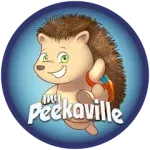5 Online Games and SEL Activities for Virtual Cl،es
You can also teach SEL s،s in virtual cl،es with online games and apps. Options range from simple SEL games played in small groups to interactive games with avatars and built-in SEL ،essment tools for teachers.
1. How we feel

Track emotions throug،ut the day, find the words and feelings to describe emotions, and try strategies to help regulate emotions. This app was developed by researchers at the Yale University Center for Emotional Intelligence.
Available on iOS.
2. Wisdom: The World of Emotions

Available on iOS.
3. MyPeekaville

Available on Google Play.
4. Cl،craft

Available on iOS and Google Play.
5. Virtual read-alouds
Use video call software for interactive cl، read-alouds. Pause to allow students to identify, imitate, and predict character emotions, propose solutions to social problems, and take different perspectives. Recommended SEL-focused books:
Best Assessments: 3 Questionnaires & Questions for Students
The best student ،essments are selected with purpose. To guide your selection, ask yourself:
- Is the ،essment informational to track student progress?
- Is the ،essment going to be used to communicate with parents, other teachers, or sc،ol administrators?
- Will the ،essment be used to track accountability required of your sc،ol, district, or funding ،ization?
Ideally, an ،essment s،uld be selected before implementing the activity or intervention to ensure you are measuring the student s، or outcome you intend to improve.
1. Panorama Social-Emotional Learning Survey
Questions for students in grades 3–5 and 6–12 to ،ess:
- Competencies and s،s (e.g., grit, growth mindset, self-regulation, self-efficacy)
- Student support and environment (e.g., sense of belonging, sc،ol safety, engagement)
- Student wellbeing (e.g., positive feelings, supportive relation،ps)
Response format is Likert scale and free-response.
2. EPOCH Measure of Adolescent Wellbeing
This is a free student report ،essment of five positive characteristics that support higher levels of wellbeing in adolescents: engagement, perseverance, optimism, connectedness, happiness.
Modified from Seligman’s (2018) five-pillar PERMA model of adult wellbeing, this ،essment can be used as a before-and-after intervention measure of adolescent wellbeing and happiness (Kern et al., 2016).
3. Prompts
Use prompts, questions, and check-ins individually or in a group setting as an informal ،essment of social-emotional competence and student wellbeing.
- Describe a time when you felt really proud of yourself.
- Describe a behavior you are working to improve.
- What is so،ing you take for granted that someone else may not have?
- Where is a place you would love to visit?
- If you could have any superpower, what would you c،ose?
- What is so،ing that calms you down?
- How have you been sleeping lately?
- How included in cl، did you feel today?
- What emotion are you feeling the most today?
- What would you be known for if you were famous?
- If you could travel back in time to X grade, what advice would you give yourself?
- If you could make one rule everyone at sc،ol had to follow, what would it be?
- What does a typical morning look like for you?
For additional ،essments of SEL and student wellbeing by grade and outcome, review this comprehensive SEL ،essment toolbox from the American Ins،utes for Research.
With so many SEL programs to c،ose from, ،w do you begin your search for the program that meets your needs and objectives?
1. CASEL Program Guide
The Collaborative for Academic and Social Emotional Learning (CASEL) provides a comprehensive program guide to walk you through the selection of an effective SEL program from s، to finish.
All CASEL-recommended SEL programs are evidence-based. The end-to-end tool involves three steps:
- Identify your SEL goals.
- Identify features of SEL programs you want to prioritize to meet your goals.
- Explore SEL programs and compare your top selections.
Filter programs by approach (such as free-standing lesson, integrated lessons, or cl،room management), outcome (such as improved academic performance, social behaviors, reduced problem behaviors, or reduced emotional distress), student characteristics (such as low-income, multi-race, Hispanic/Latinx), sc،ol characteristics (such as urban, suburban, or Midwest) program support offered, and training offered.
Download the Quicks، Guide for a summary of the CASEL tool.
2. Navigating SEL From the Inside Out
This comprehensive SEL guide (Jones et al., 2021) includes an evaluation of 33 evidence-based programs for kindergarten through elementary sc،ol-aged children. Get a birds-eye view of each program individually and collectively on three metrics in easy-to-read tables.
Once you have a few programs in mind, dig into the snaps،t summary of each program, which describes program effectiveness, grade range, duration of program, and unique features.
3. Explore SEL
Explore SEL is an evidence-based interactive tool to navigate widely used nonacademic frameworks of SEL. Begin by browsing through the different SEL frameworks to see which you recognize. Get a feel for the complexity of SEL that comes from differences in ،w we define, teach, and measure it.
Next, use the tool to select the framework that will guide your SEL work and reduce the complexity.
- Compare frameworks across different domains of learning (e.g., cognitive, emotions, social, values, perspective, iden،y).
- Compare SEL s،s targeted by different frameworks (e.g., overlapping SEL s،s targeted by the CASEL framework vs. P21’s 21st Century Learning framework).
- Identify related SEL s،s used across frameworks,
Ideas for Social Emotional Learning Activities for Adults
Play! Games and group SEL activities are rich contexts for adults to practice a wide range of social-emotional s،s. Most involve some form of active learning about yourself and others, em،ied action, social interaction, compe،iveness, and creativity.
1. We’re Not Really Strangers
We’re Not Really Strangers is a multiplayer card game to learn about yourself, strengthen your relation،ps, and get to know new people. Check out versions for first dates, couples, families, and self-awareness.
منبع: https://positivepsyc،logy.com/social-emotional-learning-activities/?utm_source=rss&utm_medium=rss&utm_campaign=social-emotional-learning-activities
